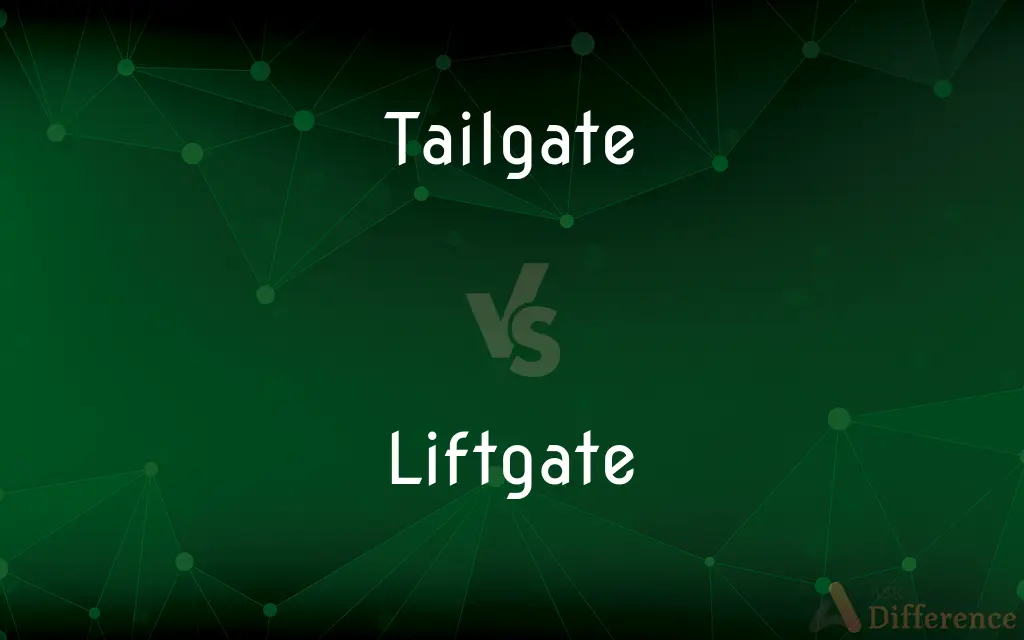Tailgate vs. Liftgate — What's the Difference?
By Maham Liaqat & Fiza Rafique — Updated on April 15, 2024
A tailgate is a hinged gate at the back of a pickup truck or similar vehicle, designed to open downwards, while a liftgate is a rear door that swings upward on a vehicle, providing access to the cargo area.

Difference Between Tailgate and Liftgate
Table of Contents
ADVERTISEMENT
Key Differences
Tailgates are typically found on pickup trucks and certain large SUVs, acting as a gate that opens by swinging downward. This design allows for easier loading and unloading of goods, particularly heavy or bulky items, and can also serve as a bench or work surface when down. Whereas, liftgates are usually equipped on vans, SUVs, and hatchbacks, consisting of a single piece that lifts upwards to allow access to the rear cargo area.
The function of a tailgate is straightforward; it can lie flat to extend the bed's usable space or close to secure cargo. This versatility makes it integral for tasks that involve hauling varying loads. On the other hand, liftgates provide a clear overhead space when open, making it easier to load large items without the obstruction of a horizontal gate.
In terms of operation, tailgates are generally manually operated and require physical strength to lower and raise. Whereas liftgates can often be automated, featuring motorized mechanisms that allow them to be opened and closed at the touch of a button, making them more convenient for frequent use.
The choice between a tailgate and a liftgate may depend on the vehicle's intended use. Tailgates are preferred for their robustness and simplicity in vehicles that frequently carry heavy loads, such as construction equipment or large quantities of materials. Liftgates, however, are more common in family and utility vehicles where ease of access and the ability to open the rear door in tight spaces are more valued.
While both types of gates serve the primary purpose of providing access to the vehicle’s rear, the tailgate is more suited to rugged use and simple operations, whereas the liftgate is geared towards convenience and accommodating environments like crowded parking lots or garages.
ADVERTISEMENT
Comparison Chart
Vehicle Type
Pickup trucks, some SUVs
Vans, SUVs, hatchbacks
Opening Mechanism
Swings downward
Swings upward
Functionality
Extends bed, secures cargo
Provides overhead access
Operation
Mostly manual
Often automated
Best For
Heavy loading, versatility
Convenience, ease of use
Compare with Definitions
Tailgate
Used to extend the flatbed of a vehicle or as a seat.
They sat on the tailgate of the pickup truck watching the sunset.
Liftgate
A rear door that opens upward to access the vehicle's cargo area.
She opened the liftgate of her SUV to take out the groceries.
Tailgate
Integral to vehicles designed for hauling heavy goods.
The tailgate can support heavy weights, ideal for loading large items.
Liftgate
Often equipped with a motorized mechanism for easy opening.
The vehicle’s liftgate can be operated with a remote control.
Tailgate
A hinged gate at the rear of a vehicle, opening downwards.
He lowered the tailgate of his truck to unload the tools.
Liftgate
Helps avoid the obstruction of a horizontal gate.
The liftgate provides clear space overhead, making loading bulky items hassle-free.
Tailgate
Often manually operated, requiring physical effort to use.
He manually lowered the tailgate to access the cargo.
Liftgate
Provides convenient and easy access, especially in tight spaces.
The liftgate makes it easier to load the car in the crowded mall parking lot.
Tailgate
Commonly found on pickup trucks and certain SUVs.
The new model features a reinforced tailgate for added durability.
Liftgate
Suitable for family and utility vehicles where frequent access is needed.
Their van’s liftgate is indispensable for their daily deliveries.
Tailgate
A hinged part that extends across the rear of a pickup truck or other vehicle and can be folded down or to a horizontal position for loading and unloading.
Liftgate
A closure at the rear of a vehicle that can be raised during loading and unloading.
Tailgate
One of the pair of gates downstream in a canal lock.
Liftgate
(truck equipment) A hydraulic or electric platform that installs onto the rear of a vehicle and which may be raised or lowered in the loading/unloading of heavy cargo
Tailgate
To drive so closely behind (another vehicle) that a collision is likely if that vehicle brakes suddenly.
Liftgate
(automotive) A closure at the rear of a vehicle, or rear door, that can be raised to access the back of a vehicle
Tailgate
To follow another vehicle too closely.
Tailgate
To participate in a tailgate party.
Tailgate
A hinged board or hatch at the rear of a vehicle that can be lowered for loading and unloading.
Tailgate
(British) The hinged rear door of a hatchback.
Tailgate
Either of the downstream gates in a canal lock.
Tailgate
(US) tailgate party
Tailgate
To drive dangerously close behind another vehicle.
That idiot has been tailgating me for the last five minutes.
Tailgate
To follow another person through access control on their access, rather than on one’s own credentials, especially when entering a door controlled by a card reader.
Tailgate
To privately purchase or sell a security immediately after trading in the same security for a client.
Front run
Tailgate
To have a tailgate party.
Tailgate
A gate at the rear of a vehicle; can be lowered for loading
Tailgate
Follow at a dangerously close distance;
It is dangerous to tailgate another vehicle
Common Curiosities
Are there safety concerns associated with tailgates or liftgates?
Safety concerns for tailgates primarily involve ensuring the gate is securely closed to prevent it from opening during transit, which could lead to loss of cargo. For liftgates, proper functioning of the lift mechanism is important to avoid unexpected closures, and safety sensors are often installed to prevent injuries.
What maintenance is required for tailgates and liftgates?
Tailgates generally require minimal maintenance, mostly involving regular checks of the hinges and latching mechanism to ensure smooth operation. Liftgates, especially those with motorized components, may require more frequent checks to ensure the electrical parts and lift mechanisms are functioning properly.
Can the opening mechanism of a liftgate be manually operated in case of a failure?
Yes, most motorized liftgates are designed with a manual override system to allow the liftgate to be opened manually in case of a mechanical or electrical failure. This is crucial for accessing the cargo area when the automatic mechanism does not work.
How do weather conditions affect the operation of tailgates and liftgates?
Extreme weather conditions, like cold or wet weather, can affect the operation of both tailgates and liftgates. For tailgates, ice or debris can hinder the mechanical parts, making them harder to open or close. Liftgates with electrical components might experience issues with sensors or circuits in very cold or damp conditions.
How do I know if my vehicle should have a tailgate or a liftgate?
The choice depends on the vehicle’s use; tailgates are better for heavy loading, while liftgates suit frequent and convenient access needs.
Is one more secure than the other?
Both can be equally secure, but the specific design and locking mechanisms will vary by vehicle model and make.
What are the main differences between a tailgate and a liftgate?
The main difference is the opening mechanism: tailgates swing downward, while liftgates lift upward.
Is there a significant weight capacity difference between tailgates and liftgates?
Tailgates typically support heavier loads as they are often part of the vehicle's structure designed for heavy-duty use, especially in trucks. Liftgates, particularly those on vans or SUVs, are designed more for convenience and may not support as much weight directly on the gate, focusing instead on providing access to load and unload cargo.
Can you convert a tailgate to a liftgate?
Converting a tailgate to a liftgate is not typically feasible due to the different mechanisms and vehicle designs.
What should I consider when choosing between a vehicle with a tailgate or a liftgate?
Consider your primary needs: if heavy loading is frequent, a tailgate might be more suitable; for daily, general use, a liftgate could be more practical.
What are the advantages of a liftgate?
Liftgates offer easy overhead access, often with automated operation, making them convenient for frequent use.
Which types of vehicles typically have tailgates?
Tailgates are commonly found on pickup trucks and some large SUVs.
Are liftgates more expensive than tailgates?
Liftgates can be more expensive due to their complex mechanisms, especially if they are motorized.
Share Your Discovery

Previous Comparison
Ubuntu vs. Xubuntu
Next Comparison
Subframe vs. FrameAuthor Spotlight
Written by
Maham LiaqatCo-written by
Fiza RafiqueFiza Rafique is a skilled content writer at AskDifference.com, where she meticulously refines and enhances written pieces. Drawing from her vast editorial expertise, Fiza ensures clarity, accuracy, and precision in every article. Passionate about language, she continually seeks to elevate the quality of content for readers worldwide.














































